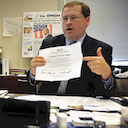
The Crypto Crisis
The latest cryptocurrency crash illustrates why the entire financial sector needs to be subject to democratic control.


The latest cryptocurrency crash illustrates why the entire financial sector needs to be subject to democratic control.

The left cannot afford to renounce its historical commitment to self-determination.

We must understand Russia’s invasion of Ukraine not to justify it, but to better find a resolution to the conflict.

The Fed’s decision to raise interest rates for the fourth time this year threatens to loosen the tightest U.S. labor market in decades. What would it look like if policymakers consolidated workers’ recent gains instead?

A new book on Claude McKay is part of an effort to place the poetry of the Harlem Renaissance within the Black radical tradition.

The politics of the 2010s and 2020s are about who the people are and what it means for them to matter.

The adaptation framework has been used to privatize public services, extract resources, and muster new reserve armies of labor. People, not capital, should determine how to reconfigure their lives in the face of climate change.

Taxes demonstrate the legitimacy of democratic control of the economy. This is what conservatives cannot accept—and what surviving climate change will require.

An interview with Senator Bernie Sanders’ foreign policy advisor Matt Duss.

While David Attenborough’s work rarely gives center stage to climate change, his project has always been to shift how humans relate to nature.

Patrick Iber, Adom Getachew, Stephen Wertheim, Aslı Bâli, Susie Linfield, Ramzi Kassem, and Darryl Li respond to “Left Internationalism in the Heart of Empire.”

In many accounts of the New York intellectuals, the prolific critic Harold Rosenberg seemed to fall through the cracks. Debra Bricker Balken’s biography reclaims him for the pantheon.

Conservative intellectuals helped bridge the gap between the religious right and the institutional Republican Party in order to end the right to abortion.

Federal housing policies contributed to the segregation of American cities in the twentieth century. But it was private interests that led the way.

An interview with Ben Tarnoff, the author of Internet for the People: The Fight for Our Digital Future.